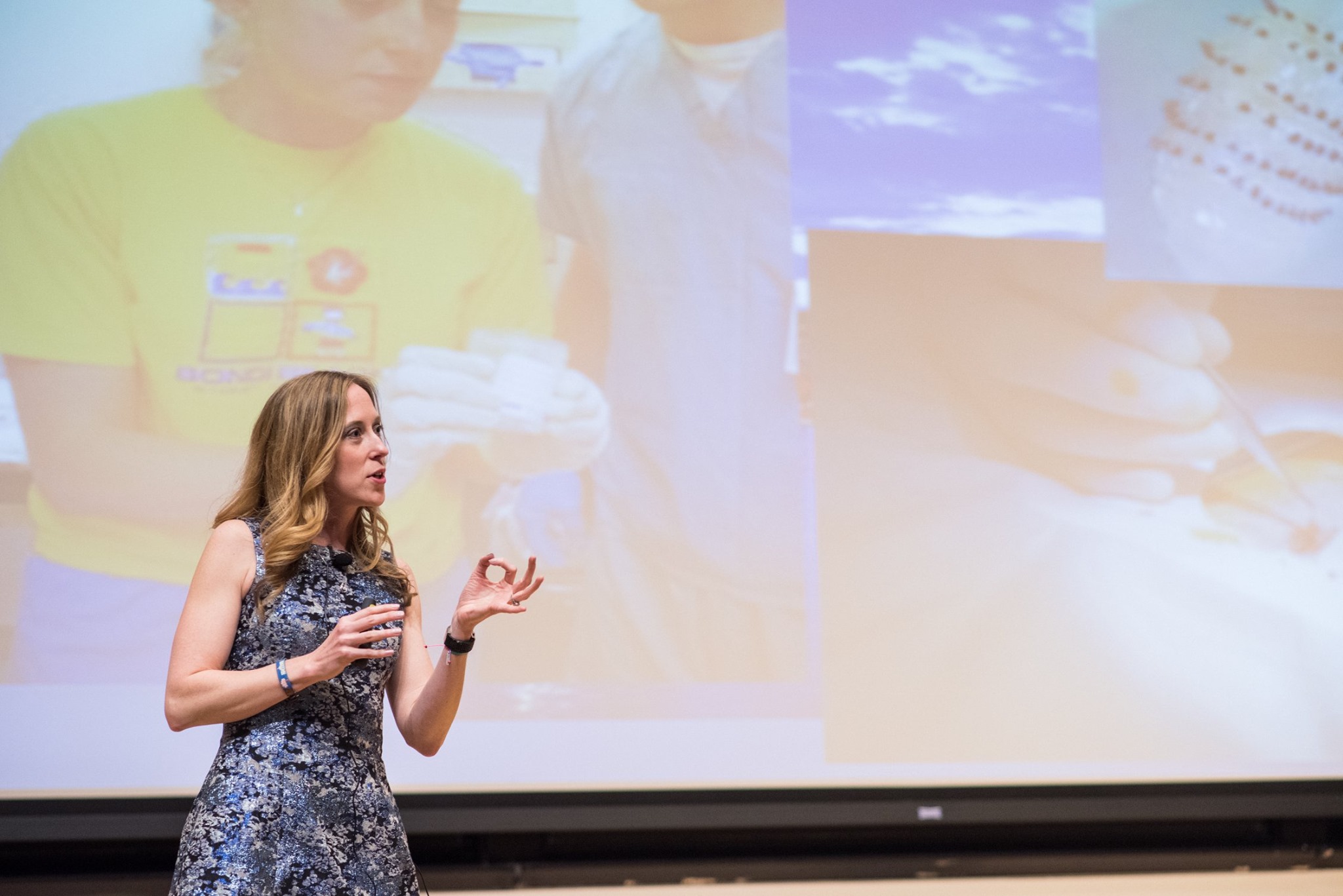2019 Keynote Speaker

Sara Brenner, MD, MPH
Watch the Keynote [YouTube]
Dr. Brenner is a preventive medicine and public health physician and tenured faculty member at the SUNY Polytechnic Institute Colleges of Nanoscale Science & Engineering (CNSE) where she is an Associate Professor of Nanobioscience and the Assistant Vice President for NanoHealth Initiatives. She is currently working in Washington DC, serving as a Senior Policy Advisor in the White House Office of Science and Technology Policy (OSTP) with a broad portfolio in biomedical science, technology, and human health.
From within the Executive Office of the President (EOP), Dr. Brenner works with U.S. Departments and Agencies, the Office of Management and Budget, the National Security Council, the Domestic Policy Council, and other White House offices to develop national policy relevant to health care, medical technology, biomedical science, innovative early-stage research, and workforce training and education. She also works to develop a strategic, multisectorial biotechnology initiatives that will improve health outcomes, reduce costs, and improve quality of life for Americans through the integration of cutting-edge technologies and health data systems at points-of-care. Her portfolio includes focus areas in health data interoperability, privacy, and national security, interagency coordination in biological and health sciences, research business models and reducing burdens on the national research enterprise, open science/open data initiatives, translational science and commercialization, biomedical research in microgravity, national public health response to combat the opioid crisis, and risk assessment and mitigation related to human exposures to contaminants of emerging concern. Dr. Brenner works closely with colleagues throughout the EOP and across numerous agencies to develop high level policy priorities, actions, and implementation strategies. She also engages numerous and diverse stakeholders from the public and private sectors in carefully crafting recommendations, policy options, and solutions to the most pressing needs and opportunities at the nexus of technology and human health.
Dr. Brenner’s academic research advances technology applications in the life sciences, including medicine and public health, as well as safeguards against unintended health effects of exposure to engineered nanomaterials. She leads health initiatives related to nanoscale and advanced material applications in medicine, as well as conducts research with diverse stakeholders to evaluate exposure in the workplace, consumer marketplace, and environment. She spear-headed the development and operation of the NanoHealth and Safety Center at CNSE, a $10M public-private partnership to address gaps in understanding of the safety and risk associated with the unique characteristics of nanoscale materials used in advanced manufacturing. Her research team incorporates theory from many disciplines including physics, engineering, biology, genetics, medicine, public health, epidemiology, industrial hygiene, and environmental science to advance risk assessment and reduction strategies for occupational exposures, monitor materials that may impact population health and public safety, and develop industrial practice standards for product safety. Dr. Brenner is also the CNSE Program Director of the MD/PhD program in Medicine and Nanoscale Science or Engineering, a program that she helped co-found with SUNY Downstate Medical Center. It is the first dualdegree clinical training program in nanomedicine that aims to produce a new, hybrid generation of physician researchers poised to integrate technology and medicine from benchtop to bedside.
Prior to joining the faculty, Dr. Brenner earned a Doctor of Medicine from the University of Iowa Carver College of Medicine, a Master of Public Health from SUNY UAlbany School of Public Health, and a Bachelor of Science in Genetics with a minor in Philosophy from Iowa State University. Her medical residencies included Internal Medicine at Evanston Northwestern and Preventive Medicine at the New York State Department of Health and UAlbany. Dr. Brenner has been professionally involved in national activities of the American College of Preventive Medicine (ACPM) and the American College of Occupational and Environmental Medicine (ACOEM), including several stints of full-time engagement in Federal health policy initiatives in Washington, DC. She is both personally and professionally dedicated to health and wellness, participating in fitness events including road, trail, and snowshoe races ranging from 1 km sprints to 50 mile ultramarathons to 200 mile ultra relays. She recently received the 2018 University of Iowa Carver College of Medicine’s Distinguished Alumna Award (Early Career Achievement), was honored in the 2016 Albany Business Review’s 40 Under 40 (Innovator), received the Albany-Colonie Chamber of Commerce Women of Excellence Award in 2012 (Emerging Professional), the ACPM “Rising Star” Award, the American Cancer Society Physician Training Award (Preventive Medicine), the A. Zamin Rizavi, MD Award (Internal Medicine), the American Medical Association Legislative Awareness and Foundation Leadership awards (AMA), and the Hancher-Finkbine Medallion (University of Iowa).
Brenner Research Team website: https://sunypoly.edu/research/team-brenner/
Further detail on research:
Through research projects spanning across a broad portfolio, Dr. Brenner serves as a link between basic life science research, occupational health, clinical translational research, direct patient care, and public health interventions aimed at improving population and individual health outcomes. Active areas of ongoing research include field-based occupational exposure assessment with workers in semiconductor fabrication facilities as well as analytical methods development to transform outdated protocols to into higher throughput, nanomaterial-specific approaches. She is also working to develop new methods and applications for direct imaging of nanoscale materials in a variety of complex matrices, including biological and environmental samples, which will facilitate researchers ranging from medicine to toxicology to pharmacology to environmental health. One specific application of these techniques is being developed using an inhalation toxicology animal model, which was designed to mimic acute and subchronic real-world exposures to engineered metal oxide nanoparticles experienced in occupational settings. Her team and collaborators are also working to develop and commercialize customized software that will expedite hyperspectral data acquisition and image analysis at the nanoscale for complex organic and inorganic samples. Additionally, Dr. Brenner and her team have spent many years investigating the movement of industrial nanomaterials through wastewater treatment systems used in semiconductor manufacturing, and they are currently exploring methods for nanoparticle characterization, retention, and removal in order to prevent environmental release.